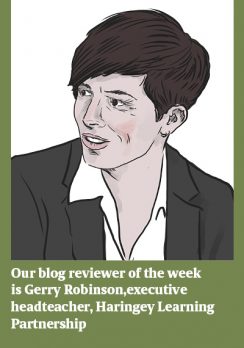The impact of the First Story programme
@FirstStory
I couldn’t write this round of reviews without including a colleague of mine, Michelle Burke, who has recently written a guest blog post for the creative writing charity First Story. An inspiring teacher and leader in her own right, in this blog Michelle discusses how bringing the First Story Young Writers’ Programme to Haringey Learning Partnership was “life-changing” for her and our students.
The writing process, Michelle says, allowed students’ voices “to be heard on their terms, without restriction. It was freedom.” What more can we hope to give our students? Michelle speaks with passion, conviction and self-reflection in this blog post which will have even the most reluctant writers hunting around for a pen and paper.
Singing for continuity and progression in year 7
@Johnfinney8
We’ve recently welcomed several musicians to Haringey Learning Partnership to share their talents with our equally talented young people. From an impromptu collaboration between one of our year 10 vocalists and a world-renowned bass guitar player, to a deeply moving performance by a member of staff at the recent Black History Month exhibition, music has been in the air since the start of term.
I was pleased, therefore, to come across a blog entitled Music Education Now by John Finney, a music teacher and researcher who seeks to “provoke thought” around music in schools. This post explores how Year 7 teachers might harness the positivity many students experience from singing at primary school and also raises interesting questions about a “negotiated curriculum” – the idea that including students in classroom decisions will help them to invest in their learning, including helping them to understand the expertise of the teacher.
At a time when there is often friction between traditional and progressive modes of teaching and learning, this thought-provoking post is worthy of consideration.
Education policy beyond the school gates
@LoicMnzs
In the first of a “two-part thinkpiece”, Menzies argues that when it comes to education policy, the focus on “schools” over “education” is disproportionate and limiting if we are to ensure that all young people are sufficiently supported.
With intense focus in schools on curriculum and pedagogy (two undeniably fundamental parts of their remit) how can we ensure other hugely important areas such as “safeguarding; SEND; speech, language and communication support; deprivation”, among other things, are adequately addressed? An important question at any time, it is especially so in the aftermath of the pandemic, when students’ and communities’ needs are even greater.
Menzies rightfully suggests that in order for this to happen, education policy will need to “cast its gaze beyond the school gates”. I look forward to reading the second part in which Menzies shares his reflections on what this could look like.
Learning from a transformative managed move
@marymered
Working in AP, I am constantly seeking to understand school exclusion in all its forms. Some would argue that “managed moves”’ are simply exclusion by another name, and there are certainly cases where this is true. Indeed, Ella, the young person featured in Meredith’s blog, experienced two other placements which had broken down before joining a third mainstream school, where she thrived.
Meredith is not advocating for managed moves all round, though; what she is exploring in this blog is how the third school supported Ella once she arrived and what made the difference for her. What she describes is “wrap-around care” and a trauma-informed approach that changed Ella’s educational experience for the better and ultimately allowed her to find her way.
As well as an evidence-based blog full of expert advice and commentary on supporting young people through managed moves, this blog also offers a heart-warming success story of a young person with a bright future ahead of her. What better way to start the long road to Christmas?













Your thoughts